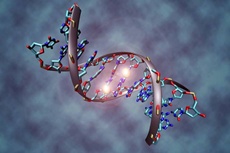Cancer “smart drugs” may not be so smart: Yale researchers
By By Karen N. Peart | 17 May 2011
Some of the most effective and expensive cancer drugs, dubbed "smart drugs" for their ability to stop tumours by targeting key drivers of cancer cell growth, are not effective in some patients. In two related studies, Yale School of Medicine researchers examined one such driver, the EGF receptor (EGFR), and found that a decoy receptor might be limiting the amount of drug that gets to the intended target.
 |
| A field of cells engineered to express human sEGFR, a cancer biomarker. |
"We know that smart drugs like Cetuximab are not always effective in the cancer cells they're supposed to target because there are no positive predictive markers for selecting the patients who will benefit from treatment with EGFR-targeted therapies, including EGFR itself," said lead author Nita Maihle, professor in the departments of obstetrics, gynecology and reproductive sciences and of pathology at Yale School of Medicine. "Why would a patient be given an expensive drug if it doesn't work? Our studies provide new insight into this paradoxical EGFR testing conundrum."
In a study published recently in the journal Cancer, Maihle and her team isolated a protein from human blood that looks like EGFR, but is actually a closely related variant called serum sEGFR. They showed that Cetuximab binds equally as well to serum sEGFR as it does to the intended EGFR cancer target.
Those study results showed that sEGFR might act as a decoy receptor in the blood of cancer patients, tying up Cetuximab and therefore limiting the amount of Cetuximab that actually gets to the intended target.
Such limitations may, in part, provide an explanation for the failure of two large phase III clinical trials on Cetuximab in colorectal cancer patients, since serum sEGFR concentrations are highly variable in cancer patients. These studies suggest that serum sEGFR should be measured and considered prior to treatment with Cetuximab. Other research has supported this concept by showing that serum sEGFR concentration changes in response to treatment with Cetuximab.
In their second related study, published online in the current issue of the journal Biochemistry, Maihle and her team show that newly developed reagents to measure sEGFR in blood and other human tissues can detect a second unrelated cell surface protein in tumor cells: alpha-5 integrin.


















